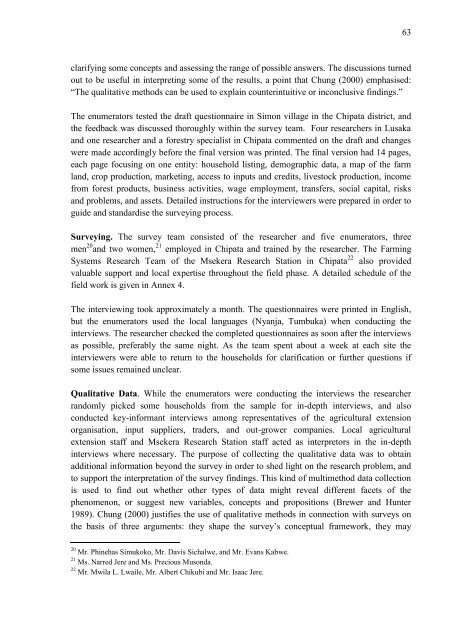Rural Income Generation and Diversification - A Case Study ... - Doria
Rural Income Generation and Diversification - A Case Study ... - Doria
Rural Income Generation and Diversification - A Case Study ... - Doria
Create successful ePaper yourself
Turn your PDF publications into a flip-book with our unique Google optimized e-Paper software.
clarifying some concepts <strong>and</strong> assessing the range of possible answers. The discussions turned<br />
out to be useful in interpreting some of the results, a point that Chung (2000) emphasised:<br />
“The qualitative methods can be used to explain counterintuitive or inconclusive findings.”<br />
The enumerators tested the draft questionnaire in Simon village in the Chipata district, <strong>and</strong><br />
the feedback was discussed thoroughly within the survey team. Four researchers in Lusaka<br />
<strong>and</strong> one researcher <strong>and</strong> a forestry specialist in Chipata commented on the draft <strong>and</strong> changes<br />
were made accordingly before the final version was printed. The final version had 14 pages,<br />
each page focusing on one entity: household listing, demographic data, a map of the farm<br />
l<strong>and</strong>, crop production, marketing, access to inputs <strong>and</strong> credits, livestock production, income<br />
from forest products, business activities, wage employment, transfers, social capital, risks<br />
<strong>and</strong> problems, <strong>and</strong> assets. Detailed instructions for the interviewers were prepared in order to<br />
guide <strong>and</strong> st<strong>and</strong>ardise the surveying process.<br />
Surveying. The survey team consisted of the researcher <strong>and</strong> five enumerators, three<br />
men 20 <strong>and</strong> two women, 21 employed in Chipata <strong>and</strong> trained by the researcher. The Farming<br />
Systems Research Team of the Msekera Research Station in Chipata 22 also provided<br />
valuable support <strong>and</strong> local expertise throughout the field phase. A detailed schedule of the<br />
field work is given in Annex 4.<br />
The interviewing took approximately a month. The questionnaires were printed in English,<br />
but the enumerators used the local languages (Nyanja, Tumbuka) when conducting the<br />
interviews. The researcher checked the completed questionnaires as soon after the interviews<br />
as possible, preferably the same night. As the team spent about a week at each site the<br />
interviewers were able to return to the households for clarification or further questions if<br />
some issues remained unclear.<br />
Qualitative Data. While the enumerators were conducting the interviews the researcher<br />
r<strong>and</strong>omly picked some households from the sample for in-depth interviews, <strong>and</strong> also<br />
conducted key-informant interviews among representatives of the agricultural extension<br />
organisation, input suppliers, traders, <strong>and</strong> out-grower companies. Local agricultural<br />
extension staff <strong>and</strong> Msekera Research Station staff acted as interpretors in the in-depth<br />
interviews where necessary. The purpose of collecting the qualitative data was to obtain<br />
additional information beyond the survey in order to shed light on the research problem, <strong>and</strong><br />
to support the interpretation of the survey findings. This kind of multimethod data collection<br />
is used to find out whether other types of data might reveal different facets of the<br />
phenomenon, or suggest new variables, concepts <strong>and</strong> propositions (Brewer <strong>and</strong> Hunter<br />
1989). Chung (2000) justifies the use of qualitative methods in connection with surveys on<br />
the basis of three arguments: they shape the survey’s conceptual framework, they may<br />
20<br />
Mr. Phinehas Simukoko, Mr. Davis Sichalwe, <strong>and</strong> Mr. Evans Kabwe.<br />
21<br />
Ms. Narred Jere <strong>and</strong> Ms. Precious Musonda.<br />
22<br />
Mr. Mwila L. Lwaile, Mr. Albert Chikubi <strong>and</strong> Mr. Isaac Jere.<br />
63

















